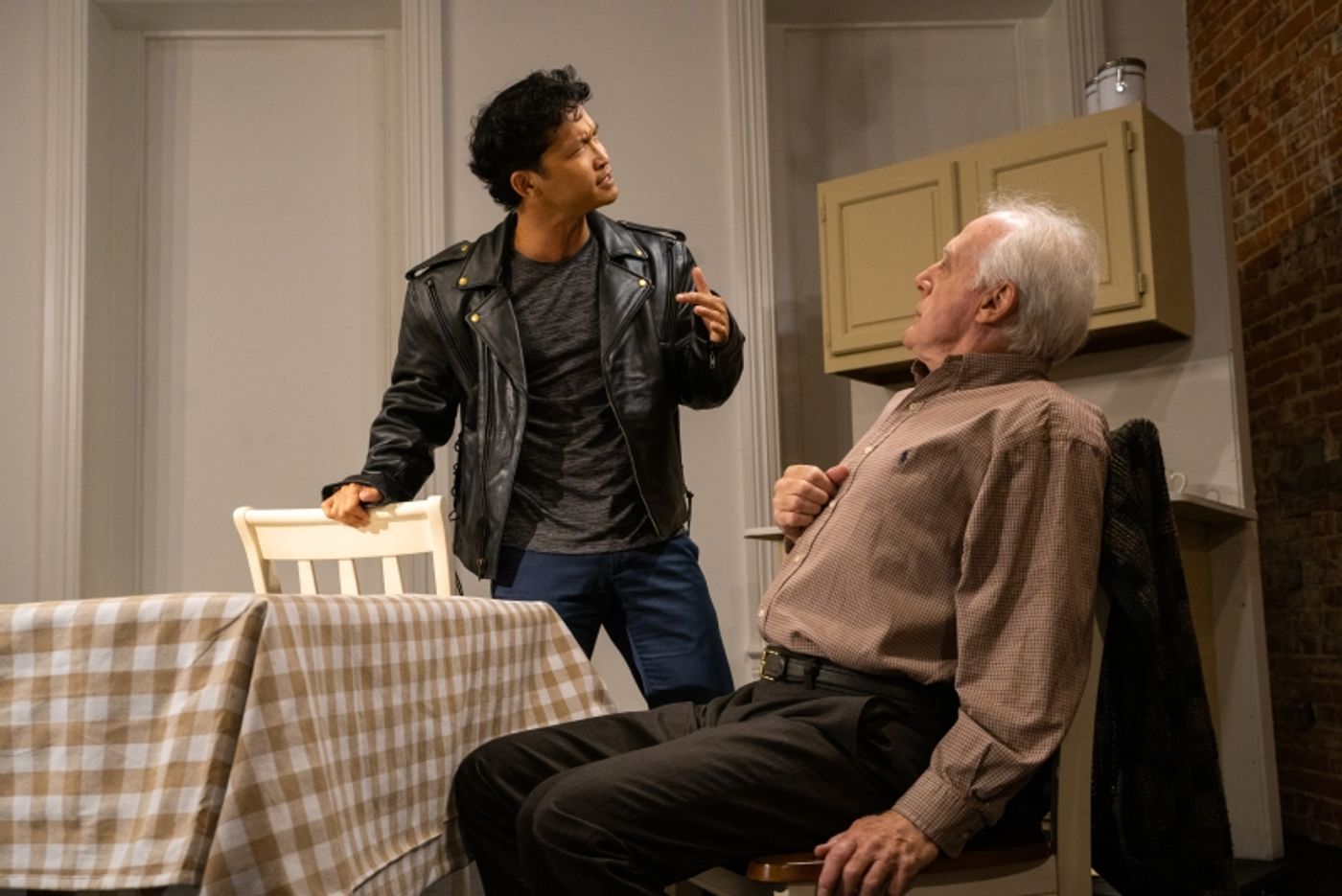Review: A NUMBER at Capital Fringe
The production runs through July 24.

The production runs through July 24.
Sprawling yet intimate, and altogether quite philosophical, Caryl Churchill's A Number is a piece about guilt, parenting, and individuality. Presented by the Edge of the Universe Players 2 at Capital Fringe, the show left with much to ponder.

The production was a small and intimate affair, both literally and in terms of spectacle. Being a fringe show, the visuals were minimal. Simone's Schneeberg set was utilitarian; it featured only a cabinet, some ceramics, a table, and two chairs. Not only did this fit the small space, and small cast, but it also evoked a small kitchen for the show to live in. There was also possible symbolism with many identical glass containers lining the counter, which, if intentional was an amusing touch.
The aforementioned small cast consisted of David Bryan Jackson and Jacob Yeh. Both actors gave delightful and nuanced, though perpindicular performances.
Jacob Yeh played multiple characters throughout the show, three to be exact, two of them (light spoilers) being clones of the other. All of these men were played convincingly, and had separate yet hauntingly parallel relationships to Jackson's father character. These characters were distinguished from each other by of course Yeh's performances, but also three distinct accents, as well as costumes. The costumes (designed by Lauren K. Lambie) were like the set in that they were simple enough and evocative enough. Each outfit signified (sometimes more subtly than others) the character's archetype. Yeh and his characters were able to create and color a world, while also themselves being individual, and having engaging arcs.
David Bryan Jackson played the father (kind of) of Yeh's characters. Unlike his partner, he remained in the same role for the eternity of the show but perhaps changed just as much. While staying constant in his cadence and personality, he changed his attitude and chemistry in response to all of the versions of his "son."
At the top of the show, the two seem slightly strange. Right off the bat, the chemistry (and the text) doesn't read as explicitly father-son. However, as we learn the context of the show, and see each iteration of the "son" interact with the dad, it seems intentional, and actually a very smart and apt move from the director, Stephen Jarrett.
Throughout the show, it is revealed that Jackson's character had a son who he treated... less than ideally after his wife (the boy's mother) died. The son (one of Yeh), changed in personality and the father eventually could not stand it and sent him away, only to miss him, and get him cloned to more or less start over.
This moral quandary and identity crisis-inducing act comes to haunt the Father, as his son learns he is not the original, and the original learns that he was cloned.
The show explores different opinions on individuality through the different versions of the son. It presents a compelling and nuanced probe into the ideas of how one's life and personality are formed. This discussion of "nature versus nurture" if you will, manifests itself through themes of blame, responsibility, and trauma.
The piece also deals heavily with guilt and retribution. In a way, (both striking and a tad humorous), the show reminded one of Dicken's A Christmas Carol. An old man is visited by three different beings, each representing different ideals, outlooks, and aspects of the path, all pointing towards him. Perhaps this character is being punished, perhaps this is what he deserves? Or perhaps, he, in an act of selfishness, accidentally created something miraculous, and even grand?
Jackson's character still somehow manages to make you feel for him, even when it is slowly revealed that he was negligent of a child, and made brash, potentially amoral decisions all to try and reconcile something he disturbed in the first place.

The show exists in a realm of sci-fi but feels incredibly immediate and tangible. It is not preoccupied with concept, but with reality, and lends itself to the humans in the audience.
Concise, effective, and charmingly bare bones, this production does a good job of tackling a complex show from a beloved playwright. Perfect for those who love pondering the intersection between identity and technology, with good, well-executed realistic dialogue, and of course Ms. Churchill herself, A Number, is a thought-provoking, intellectual, and full-bodied show that contains laughs, sighs, and perhaps even a gasp or two.
The show runs through the 24th, and is part of the Capital Fringe Festival. Tickets for both can be found at capitalfringe.org. Audiences should be advised that the show deals with themes of child neglect, and suicide, and references strong violence.
Reader Reviews
Videos

